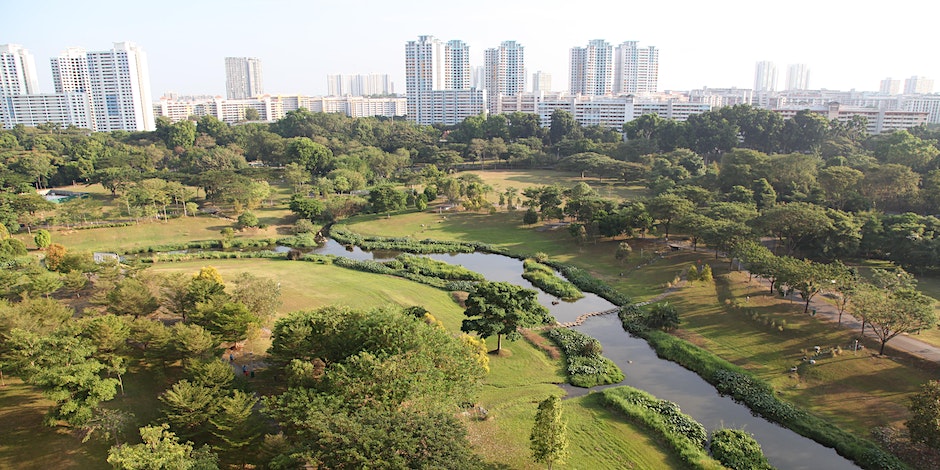
Global Seminar | Resilient, Regenerative, Responsive - Sponge cities in times of climate change
In this seminar, Herbert Dreiseitl will first give a hands-on introduction with real water experiments, a basic thought exercise to understand the elastic and regenerative nature of water, which he calls 'Fluid Thinking'.

Resilient, Regenerative, Responsive - Sponge Cities in times of Climate Change, yesterday today and for tomorrow
Date: Wed, 1 November
Time: 5-6pm SGT / 10-11am CET
Venue: Value Lab Asia, L6, Create Tower
Zoom: external page https://ethz.zoom.us/j/63717185672
Register: Scan the QR code or external page at this link
Abstract
How do you reconcile increasingly hot dry seasons and torrential rains that make healthy living in our growing cities increasingly difficult? A problem that was played down 40 years ago, and for which first attempts at a solution were laughed at, has long since been caught up with reality. In times of exacerbating climate crisis, the issue of water in the city and in the countryside is playing an ever greater role, and has arrived in urban areas under the term "sponge city".
But what are the essential basics, what are the beginnings of this development, and where is the "journey" going in the future?
As a pioneer in this field, Herbert Dreiseitl, as an interdisciplinary planner, set pioneering pilot projects and new standards as early as the 1980s. Today, he and his team advise many cities and regions, he teaches at various universities worldwide and is currently the first visiting professor of the newly founded NUS Cities Initiative.
In the upcoming FCL Global Seminar, Herbert, together with his partner Bettina Dreiseitl and his collaborator from Singapore, Raymond Yong, will first give a hands-on introduction with real water experiments, a basic thought exercise to understand the elastic and regenerative nature of water, which he calls "Fluid Thinking".
A special reference to Switzerland is his first "sponge city" projects such as in Echallens "Homeau de la Fontaine", realised 40 years ago in 1983, and Herbert will highlight Switzerland's pioneering work at that time such as the General Drainage Planning (GEP).
Today, many cities follow the principles of the Sponge City, and Singapore, as one of the pioneer cities, has a very progressive policy strategy, such as the ABC guidelines, to use rainwater as a resource and integrate it holistically into urban development with predominantly nature-based solutions.
But Switzerland and Singapore are among the wealthiest countries in the world, so it is easy to criticise whether poorer regions can afford such measures. Here, too, there are successful approaches such as in Jakarta, which, however, are much less complicated in the process and question tendencies in this country such as overregulation, security phonatisms and administrative bureaucracy.
With his contribution, Herbert wants to stimulate a debate on the future development of the Blue-Green Infrastructure for less prosperous regions and cities. After all, developments on climate issues, such as the global water question and security, are primarily decided in those locations.
Biography
Herbert Dreiseitl is an urban designer, landscape architect, water artist, interdisciplinary planner and Professor in Praxis. His focus is on creating Liveable Cities around the world where Herbert is an internationally highly respected expert with a special hallmark on the inspiring and innovative use of water to solve urban environmental challenges, connecting technology with aesthetics, encouraging people to take care and ownership for places. He has realized ground breaking contemporary projects in the fields of climate resiliency, stormwater management, urban planning and landscape architecture like Berlin Potsdamer Platz with Renzo Piano, Tanner Springs Park Portland OR USA, or Bishan-Ang Mo Kio Park in Singapore. He lectures worldwide and has authored many publications including several editions of Waterscapes, Planning, Building and Designing with Water.
He has founded Atelier Dreiseitl in1980 a globally integrated design firm with a long- standing history of excellence in urban design, landscape architecture and resilient ecological planning. Atelier Dreiseitl is now Ramboll Henning-Larsen. Herbert developed the “Liveable Cities Lab” (LCL), a thinktank at the Ramboll Group International.
Today Herbert is an independent consultant for many cities and initiatives around the globe. His work integrates regenerative processes, demonstrating a portfolio of site- responsive interventions of community based urban planning and environmental sensitive engineering.
Herbert initiated and influenced several important movements like the WSUD, the ABC Water Guidelines for Singapore, Cloudburst projects in Copenhagen, New York City and Washington DC in cooperation with the Ramboll team; he also led research projects like with MIT, Harvard GSD, NUS and Zeppelin University, for a successful implementation of Blue/Green Infrastructure in dense cities worldwide.
Herbert Dreiseitl is also known for his Artwork and Aesthetics combining Regenerative, Resilient and Smart Technology with policymaking and good governance. He is always asking how to bring best value to the society, create a culture of inspiration, and implement better integrated solutions to humanize cities. Through a collaborative network, as Harvard GSD Loeb Fellow and regular Visiting Professor at NUS Singapore. 2020 Herbert and his wife Bettina created Dreiseitl Consulting GmbH and are currently giving workshops and advice to many initiatives and cities around the world to improve their projects with resiliency and regenerative frame conditions.